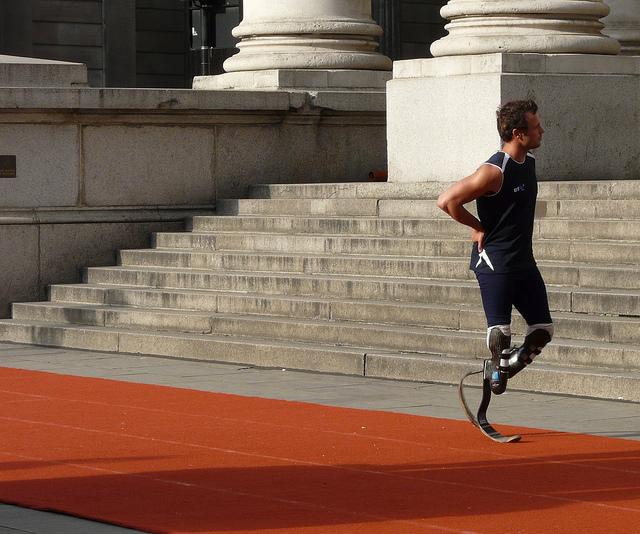Double-amputee Oscar Pistorius to compete in two Olympic events
Oscar Pistorius will be the first amputee track athlete to compete in the Olympics. (Photo by Karva Javi via Flickr CC.)
South-African runner Oscar Pistorius, a double amputee known as the Blade Runner, will have the chance this summer to be the first Paralympic track athlete to compete in the Olympics.
On Wednesday, South Africa’s Olympic Committee announced Pistorius would be on its roster for the the London Games that start next month. He’s scheduled to run both the 1,600-meter relay and the individual 400-meter, his favorite race.
“Today is really (one) of the happiest days of my life!” he said on Twitter. “Will be in @London2012 for both the Olympic and Paralympic Games!”
Pistorius, 25, was born without fibulas and had his lower legs amputated when he was 11 months old. He’s spent his entire life on prosthetic legs. But as he prepares for his Olympic debut, Pistorius faces mounting criticism over the carbon-fiber blades he runs on.
In 2008, the International Association of Athletics Federations ruled he had an unfair advantage over able-bodied runners because of them. Though the Court of Arbitration of Sport overruled its decision in 2011, some runners remain skeptical.
American runner Michael Johnson says Pistorius never has to worry about shin splints or fatigue like able-bodied runners do. Others have criticized him for needing less oxygen and fewer calories.
John Register, an amputee and Paralympic silver medalist, said Pistorius’ disadvantages as a double amputee far outweighed any advantages he might have. He questions whether Johnson or other able-bodied athletes could compete against Pistorius if they too were amputees.
“If you think he has an unfair advantage then go cut your legs off, strap on some blades and go race him,” he said.
Craig Spence, director of communications for International Paralympic Committee, says people get too caught up in the debate over the prosthetic legs. He hopes Pistorius’ Olympic debut will inspire people and change perception of what can be achieved by someone with a disability.
“One thing to remember here is that Oscar Pistorius has run on the same blades and the same technology for seven years,” he said. “Yet he’s managed to take two and half seconds off his personal best for the 100 meters. Now that is through his hard training and work rather than his technology.”
